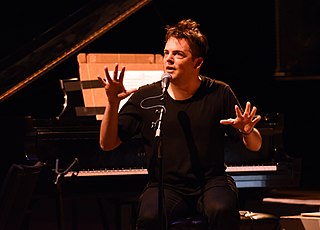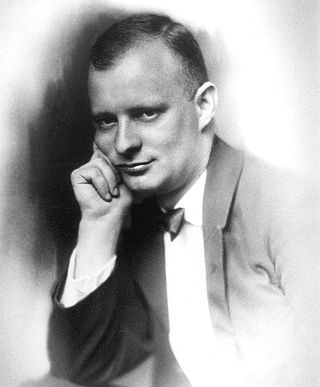Related Research Articles

The Piano Concerto No. 1 in B♭ minor, Op. 23, was composed by Pyotr Ilyich Tchaikovsky between November 1874 and February 1875. It was revised in 1879 and in 1888. It was first performed on October 25, 1875, in Boston by Hans von Bülow after Tchaikovsky's desired pianist, Nikolai Rubinstein, criticised the piece. Rubinstein later withdrew his criticism and became a fervent champion of the work. It is one of the most popular of Tchaikovsky's compositions and among the best known of all piano concerti.

The 5 Browns are a classical piano ensemble consisting of five siblings—two brothers and three sisters. Their repertoire ranges from beloved concert hall staples, such as Igor Stravinsky's The Rite of Spring, Gershwin's Rhapsody in Blue, and Grieg's In the Hall of the Mountain King to lesser known works like Nico Muhly's Edge of the World and John Novacek's Reflections on Shenandoah. In addition to their work on five pianos, The 5 Browns perform and record works for solo piano, two pianos, and in various other combinations.

Kirill Gerstein is a Russian-American concert pianist. He is the sixth recipient of the Gilmore Artist Award. Born in the former Soviet Union, Gerstein is an American citizen based in Berlin. Between 2007-2017, he led piano classes at the Stuttgart Musik Hochschule. In 2018, he took up the post of Professor of Piano at the Hanns Eisler Hochschule in Berlin in addition to the Kronberg Academy’s Sir András Schiff Performance Programme for Young Artists.
Christopher Chapman Rouse III was an American composer. Though he wrote for various ensembles, Rouse is primarily known for his orchestral compositions, including a Requiem, a dozen concertos, and six symphonies. His work received numerous accolades, including the Kennedy Center Friedheim Award, the Grammy Award for Best Classical Contemporary Composition, and the Pulitzer Prize for Music. He also served as the composer-in-residence for the New York Philharmonic from 2012 to 2015.

Nico Asher Muhly is an American contemporary classical music composer and arranger who has worked and recorded with both classical and pop musicians. A prolific composer, he has composed for many notable symphony orchestras and chamber ensembles and has had two operas commissioned by the Metropolitan Opera. Since 2006, he has released nine studio albums, many of which are collaborative, including 2017's Planetarium with Sufjan Stevens, Bryce Dessner & James McAlister. He is a member of the Icelandic music collective and record label Bedroom Community.
Francis Poulenc's Concerto pour deux pianos in D minor, FP 61, was composed over the period of three months in the summer of 1932. It is often described as the climax of Poulenc's early period. The composer wrote to the Belgian musicologist Paul Collaer: "You will see for yourself what an enormous step forward it is from my previous work and that I am really entering my great period." The concerto was commissioned by and dedicated to the Princess Edmond de Polignac, an American-born arts patron to whom many early-20th-century masterpieces are dedicated, including Stravinsky's Renard, Ravel's Pavane pour une infante défunte, Kurt Weill's Second Symphony, and Satie's Socrate. Her Paris salon was a gathering place for the musical avant-garde.
The Violin Concerto is a concerto for violin and orchestra in three movements by the American composer Elliott Carter. The work was jointly commissioned by the San Francisco Symphony and the violinist Ole Bøhn. It was completed February 26, 1990 in Waccabuc, New York, and was premiered May 2, 1990 in San Francisco, with conductor Herbert Blomstedt leading Bøhn and the San Francisco Symphony. The piece won the 1994 Grammy Award for Best Classical Contemporary Composition.
Anthology of Fantastic Zoology is an orchestral symphony by the American composer Mason Bates. The work was commissioned by the Chicago Symphony Orchestra, for whom Bates was then composer-in-residence. It was premiered June 18, 2015 at Symphony Center in Chicago, with the Chicago Symphony Orchestra performing under conductor Riccardo Muti, to whom the work is dedicated. The piece is based on the eponymous book by Jorge Luis Borges.
The Cello Concerto is a concerto for solo cello and orchestra by the American composer Nico Muhly. The work was commissioned by the Barbican Centre for the Britten Sinfonia and cellist Oliver Coates, to whom Muhly dedicated the piece. It was first performed on March 16, 2012 at the Barbican Centre by Coates and the Britten Sinfonia under conductor André de Ridder.
Loco is an orchestral composition in one movement by the American composer Jennifer Higdon. The work was commissioned by the Ravinia Festival of Highland Park, Illinois to commemorate the Ravinia train as part of the Train Commission Project. It was first performed on July 31, 2004, at the Ravinia Festival by the Chicago Symphony Orchestra.
The Seamstress is a concerto for solo violin and orchestra by the British-born composer Anna Clyne. The work was commissioned by the Chicago Symphony Orchestra, for which Clyne was then composer-in-residence. It was first performed May 28, 2015 at Symphony Center, Chicago by the violinist Jennifer Koh and the Chicago Symphony Orchestra under conductor Ludovic Morlot. The Seamstress marks the second collaboration between Clyne and Koh, who had previously premiered Clyne's double violin concerto Prince of Clouds in November 2012.
Mixed Messages is a single-movement composition for orchestra by the American composer Nico Muhly. The work was commissioned by the Philadelphia Orchestra and was premiered in Philadelphia on May 13, 2015 by the Philadelphia Orchestra under the conductor Yannick Nézet-Séguin.
The Viola Concerto is a composition for solo viola and orchestra by the American composer Nico Muhly. Composed in 2014, the work was jointly commissioned by the Orquesta Nacionales de España, the Detroit Symphony Orchestra, Festival de Saint Denis, and the National Arts Centre Orchestra. It was first performed on February 6, 2015 by the violist Nadia Sirota and the Orquesta Nacionales de España under the conductor Nicholas Collon. The piece was later given its United States premiere on October 23, 2015, by Sirota and the Detroit Symphony Orchestra under Leonard Slatkin.
The Concerto No. 3 for Piano and Orchestra "The Mysteries of Light" is the third piano concerto by the Scottish composer James MacMillan. The work was commissioned by the Minnesota Orchestra and was first performed on April 14, 2011 in Orchestra Hall, Minneapolis, by the pianist Jean-Yves Thibaudet and the Minnesota Orchestra under the conductor Osmo Vänskä.
Soundings is an orchestral composition by the American composer Elliott Carter. The work was commissioned by the Chicago Symphony Orchestra for their final season with the conductor Daniel Barenboim as music director. It was first performed on October 6, 2005 at the Symphony Center, Chicago, by Barenboim and the Chicago Symphony Orchestra.
The Flute Concerto is a composition for solo flute and orchestra by the American composer Ned Rorem. The work was commissioned by the Philadelphia Orchestra and was composed between August 2001 and May 2002. Its world premiere was given by the flutist Jeffrey Khaner and the Philadelphia Orchestra conducted by Roberto Abbado at the Kimmel Center for the Performing Arts on December 4, 2003.
The Piano Concerto No. 4 for Left Hand and Orchestra is the fourth piano concerto by the American composer Ned Rorem. It was commissioned by the Curtis Institute of Music for the pianist Gary Graffman. The work was first performed by Graffman and the Curtis Institute of Music Orchestra conducted by André Previn at the Academy of Music, Philadelphia, on February 4, 1993. Its New York City premiere was performed the next day by the same ensemble at Carnegie Hall. A then-unknown Hilary Hahn performed a solo violin section for both performances.

Klaviermusik mit Orchester, Op. 29, is a 1923 piano concerto by Paul Hindemith. Subtitled Klavier nur linke Hand, it is a piano concerto for the left hand alone. It was commissioned by the pianist Paul Wittgenstein, who lost his right arm in the World War. He never played the piece, and when he died, his widow refused access to the score. The premiere, after her death, was played in Berlin in 2004, with Leon Fleisher as the soloist and the Berlin Philharmonic conducted by Simon Rattle. It was published by Schott.
In Certain Circles is a concerto for two pianos and orchestra written in 2020 by the American composer Nico Muhly. The work was commissioned for the pianists Katia and Marielle Labèque by the New York Philharmonic, the Tonhalle Düsseldorf-Düsseldorfer Symphoniker, the Orchestre de Paris-Philharmonie de Paris, and the Royal Liverpool Philharmonic. Its world premiere was given by the Labèque sisters and the Orchestre de Paris conducted by Maxim Emelyanychev at the Philharmonie in Paris on July 6, 2021.
Register is an organ concerto written in 2017 by the American composer Nico Muhly. The work was written on a joint commission from the Los Angeles Philharmonic, the Philadelphia Orchestra, and the Southbank Centre. Its world premiere was given by the organist James McVinnie and the Los Angeles Philharmonic conducted by James Conlon at the Walt Disney Concert Hall, Los Angeles, on February 23, 2018.
References
- 1 2 3 Muhly, Nico (2011). "Edge of the World". Music Sales Group . Retrieved August 27, 2017.
- ↑ von Rhein, John (August 11, 2011). "Five-pianist concerto makes an enjoyable premiere at Ravinia". Chicago Tribune . Retrieved August 27, 2017.
- ↑ Fisher, Gerald (August 10, 2011). "The 5 Browns unveil Muhly premiere at Ravinia". Chicago Classical Review. Retrieved August 27, 2017.